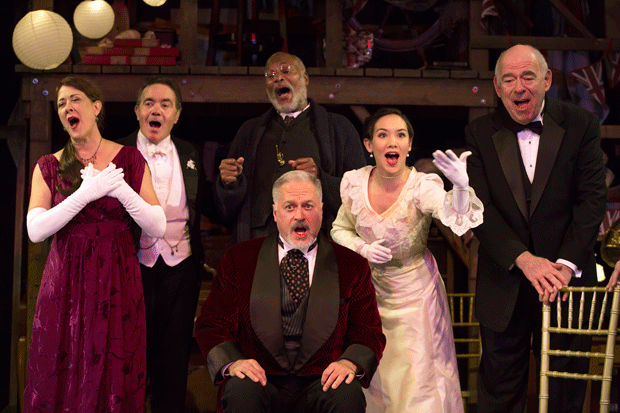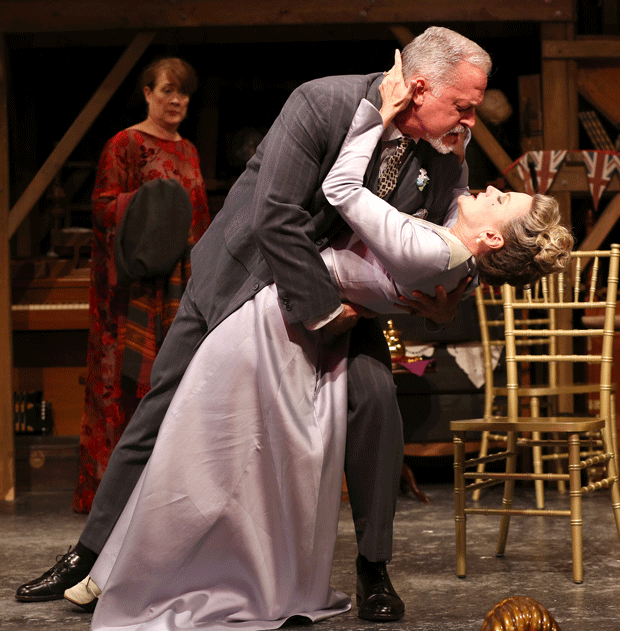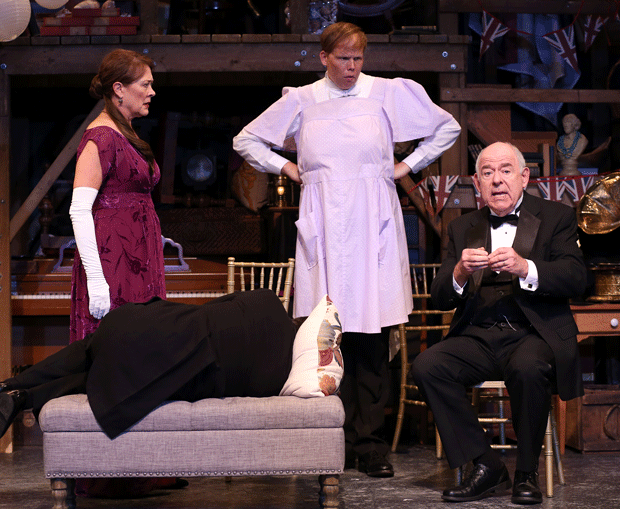In Heartbreak House, War Is on the Horizon — Again!
Bernard Shaw’s World War I-era play issues prophetic warnings in this Gingold Theatrical Group production.

(© Carol Rosegg)
September 1940. An air raid is underway in London, and a group of actors have taken shelter — along with us, the audience — in the basement of a theater where they were ready to provide us with some lighthearted fare until bombs started raining down on the city. To keep everyone calm, the actors get us to join in a sing-along of "Pack Up Your Troubles" before they decide that the show must go on. But a Shaw play seems more suitable now. Ultimately, they decide on Heartbreak House.
This World War II scenario is not what Shaw had in mind for his trenchant antiwar comedy, which was first produced in 1920. Yet director David Staller has cannily, though not always successfully, adapted the play to make it what Shaw may have first conceived it as — a dire warning about how corporate greed, societal anomie, and political corruption were about to hurl the world into global conflict. Staller's take sometimes sacrifices the play's comical moments for the sake of this frame-story innovation, but it does make a good case for Heartbreak House being a cautionary tale for our own times.
The madcap story takes place in 1914, at the advent of World War I, as a young woman named Ellie (played with aggressive innocence by Kimberly Immanuel) arrives at the Sussex villa of the eccentric Captain Shotover (Raphael Nash Thompson in a jovial yet prosy performance). His daughter Hesione Hushabye (an elegant and wry Karen Ziemba) has invited Ellie to the house to convince her not to marry the corrupt businessman and sometime politician Boss Mangan (played with hair-tousled abandon by Derek Smith), who took advantage of her impoverished father, Mazzini Dunn (Lenny Wolpe as a well-meaning milquetoast). Ellie would like to marry for love, but isn't marriage really just a business transaction anyway?

(© Carol Rosegg)
Meanwhile, Hesione's patrician sister, Lady Utterword (Alison Fraser speaking with delicious disdain for everyone), returns after a 23-year absence, and is infuriated that no one recognizes her. Ellie discovers that she is in love with Hesione's dashing husband, Hector Hushabye (played with histrionic flair by Tom Hewitt), and Lady Utterword's effete brother-in-law, Randall (a hysterical Jeff Hiller in one of three roles), pathetically expresses his love for his sister-in-law. As lies are told, hearts are broken, and frauds are exposed, a bomb is heard in the distance, and the unsuspecting inhabitants of Heartbreak House find themselves quite possibly on the brink of annihilation.
At the center of all this mayhem is Shaw's preoccupation with the destructive impulses of the moneyed classes — greed, political ineptitude, and overall laziness among them. A few performances capture these qualities exceptionally well. Ziemba, the bohemian of the group, enters in a diaphanous, red-patterned gown (well-chosen costumes by Barbara A. Bell) and speaks with the confidence of a woman who has never felt compelled to conform to society's mores. Hewitt makes his Hector a delightful caricature of a self-important hero and seems to believe the tall tales he tells Ellie about himself. Also giving a brilliant performance, Fraser embodies the arrogant aristocracy to a T, trilling the r in Randall's name with contempt as he tries to make love to her while she holds him at arm's length. Hiller for his part hilariously chews the scenery to pieces as both Randall and the laid-back housemaid, Guinness.
Despite these fine performances, Staller's direction stumbles at times. Scenes in the first act drag when the jokes don't land. Brian Prather's set, a stage filled with a basement-full of old theater props, also feels out of sync with the play. Shaw originally called for the set to resemble the hull of a ship and imagined the inhabitants of Heartbreak House as passengers who were sailing toward disaster. In this production, that powerful physical imagery is gone and is replaced instead with theatrical rigging rope, stacks of military sandbags, and a large stairway that Captain Shotover pointlessly walks up and down.
Still, Staller has done something important by bringing this infrequently produced play to the stage at this moment in time. In a world erupting with corrupt, amoral businessmen and politicians, we are dangerously divided along class lines and every other kind of tribal affiliation. Heartbreak House advises us, as we're sitting cozy in the theater, not to ignore the warning signs again.

(© Carol Rosegg)







